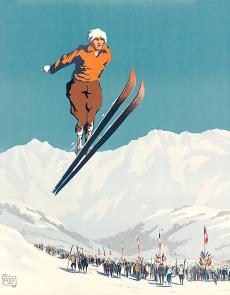
SKIING HISTORY
Editor Kathleen James
Art Director Edna Baker
Contributing Editor Greg Ditrinco
ISHA Website Editor Seth Masia
Editorial Board
Seth Masia, John Allen, Andy Bigford, John Caldwell, Jeremy Davis, Kirby Gilbert, Paul Hooge, Jeff Leich, Bob Soden, Ingrid Wicken
Founding Editors
Morten Lund, Glenn Parkinson
To preserve skiing history and to increase awareness of the sport’s heritage
ISHA Founder
Mason Beekley, 1927–2001
ISHA Board of Directors
Seth Masia, President
Wini Jones, Vice President
Jeff Blumenfeld, Vice President
John McMurtry, Vice President
Chan Morgan, Treasurer
Einar Sunde, Secretary
Richard Allen, Skip Beitzel, Michael Calderone, Christin Cooper, Art Currier, Dick Cutler, Chris Diamond, David Ingemie, Rick Moulton, Wilbur Rice, Charles Sanders, Bob Soden (Canada)
Presidential Circle
Christin Cooper, Billy Kidd, Jean-Claude Killy, Bode Miller, Doug Pfeiffer, Penny Pitou, Nancy Greene Raine
Business & Events Manager
Kathe Dillmann
P.O. Box 1064
Manchester Center VT 05255
(802) 362-1667
kathe@skiinghistory.org
Membership Services
Laurie Glover
(802) 375-1105
laurie@skiinghistory.org
Corporate Sponsorships
Peter Kirkpatrick
(541) 944-3095
peterk10950@gmail.com
Bimonthly journal and official publication of the International Skiing History Association (ISHA)
Partners: U.S. Ski and Snowboard Hall of Fame | Canadian Ski Museum and Hall of Fame
Alf Engen Ski Museum | North American Snowsports Journalists Association | Swiss Academic Ski Club
Skiing History (USPS No. 16-201, ISSN: 23293659) is published bimonthly by the International Skiing History Association, P.O. Box 1064, Manchester Center, VT 05255.
Periodicals postage paid at Manchester Center, VT and at additional mailing offices. Postmaster: Send address changes to ISHA, P.O. Box 1064, Manchester Center, VT 05255
ISHA is a 501(c)(3) public charity. EIN: 06-1347398
Written permission from the editor is required to reproduce, in any manner, the contents of Skiing History, either in full or in part.
Peter Dodge and the Rebirth of NCAA Racing
Above: Dartmouth coach Dodge in the finish area at the Birds of Prey World Cup giant slalom event at Beaver Creek, Colorado in 2017. Edith Thys Morgan photo.
A former World Cup and pro racer, Dartmouth’s men’s alpine coach has led the return to relevance of U.S. college racing.
Although few ski racers have been able to take to the slopes this summer, the racing community has been hotly debating the relationship between NCAA skiing and U.S. Ski and Snowboard in athlete development. It’s a long-running argument. At its heart is the question of how elite racers can—or cannot—use collegiate competition in their path to the World Cup.
For more than 30 years, Dartmouth College alpine coach Peter Dodge has been leading that conversation.
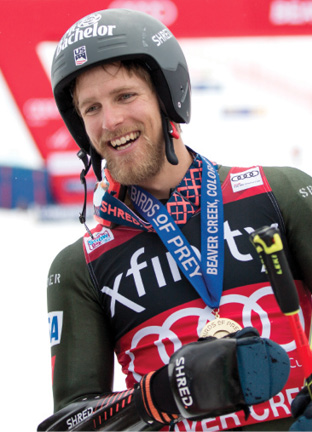
Every December, at the Birds of Prey World Cup giant slalom in Beaver Creek, Colorado, the finish area is awash in a sea of green parkas, emblazoned with the iconic Dartmouth ski team snowflake. Dodge is always there, surrounded by student athletes cheering on fellow and former Dartmouth classmates. This past year, they were rooting for Tommy Ford, the eventual winner, and also for 2018 graduate Brian McLaughlin and current student George Steffey, competing in his first-ever World Cup event.
Now entering his 14th year on the U.S. Ski Team, Ford has attended Dartmouth as many national team athletes have—by patching terms together opportunistically while rehabbing from injuries and during off-season breaks. Like Steffey, Ford never raced for Dartmouth on the NCAA circuit. By contrast, McLaughlin, the 2018 NCAA giant slalom champion, is the latest in a trend of promising American skiers who attended college full-time while racing on the NCAA circuit. He emerged with the skills, maturity and ranking to make the jump to the World Cup.
One man who’s been instrumental in creating an environment where such success can happen—especially for American athletes—is Dodge, who’s coached the Dartmouth men’s alpine team since 1990. Looking at his own path in ski racing helps to explain his motivation.
RURAL VERMONT ROOTS
Dodge and his older brother Dave grew up in St. Johnsbury, in the heart of Vermont’s Northeast Kingdom. As he remembers it, “every little town had a rope tow.” Their father, Dave “Duffy” Dodge, an interstate highway builder who had raced for the University of Vermont, taught the boys how to ski under the lights on the rope tows of the Lyndon Outing Club. “Skiing” also included cross-country touring and jumping. On weekdays after school the boys would climb the hill behind the Murphy family’s hotel. They hauled a few saplings along and used them as slalom gates. On weekends, they’d go to the “big mountain” at Burke.
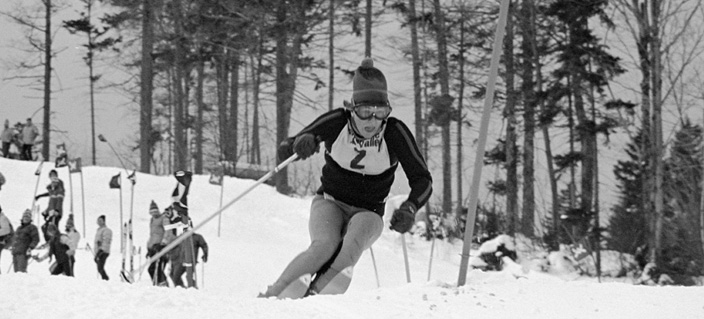
Racing in that corner of northern Vermont was a down-to-earth affair. On the way to a competition in tonier Stowe, the younger Dodge remembers mentioning to his Dad that the Stowe kids were “a bit stuck up.” Duffy gave his son some no-nonsense advice: “Beat them and they’ll be your friends.” Dodge did just that, and fondly remembers a mass snowball fight that same afternoon with his new buddies. Soon Dodge’s skiing skills would take him well beyond the Kingdom.
Dodge worked his way up the skiing ranks, attending regional camps and national competitions while attending public high school at St. Johnsbury Academy. Meanwhile, the Murphys helped to entice Warren Witherell to come to Vermont, where he started Burke Mountain Academy in 1970. At Burke, coaches Witherell and Chris Jones — as well as Eastern Regional coach George Ostler — helped Dodge to progress. By the time he graduated from high school in 1973, he was on the National Development Team.
HITTING THE ROAD
After one gap year, Dodge started Dartmouth in the fall of 1974. He took the winter off, won the 1975 Can-Am title, and spent the next year on the U.S. Ski Team before being demoted to the C Team. After a lackluster season racing in Europe, Dodge was dropped from the team and returned to Dartmouth in the fall of 1976. Following his fall term, he returned to form, winning the early season races in December 1976. Dodge was then offered and declined a spot on the D Team, with far less accomplished athletes.
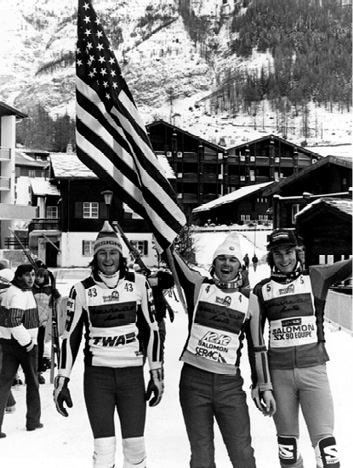
That was when he had his first epiphany. “I was sitting in the parking lot of my brother’s fraternity during Christmas break, and it was about 60 degrees. I remember thinking ‘I know I can ski better than this.’” He decided right then to go to Europe on his own.
Dodge recruited Bill Doble as his ski tech and Swiss native Konrad “Butch” Rickenbach — then a student at Burke Mountain Academy — as his coach. Finally, he talked his parents into buying a Peugeot for European delivery so they could get around. After a month together, and strong results, the trio broke up and Dodge joined a Europa Cup tour (funded by the Europa Cup) through Czechoslovakia and Poland. The entire tour, with racers from 15 nations, literally piled into a Russian airplane in Zurich, and then traveled around by bus, with ski bags in the aisle. “It was super fun,” recalls Dodge. His results earned him a spot on the U.S. B Team, and he competed in World Cup races the following season.
Despite finishing 1979 with two top-15 World Cup finishes in Stratton and Waterville Valley, when coach Bill Marolt tracked him down by phone at his brother’s condo in Burlington that spring, it was to kick him off the team. That was when he had his second epiphany. “It was the same story as before. I put down the phone—click—and said, ‘I just turned pro!’” Dodge recalls with a laugh.
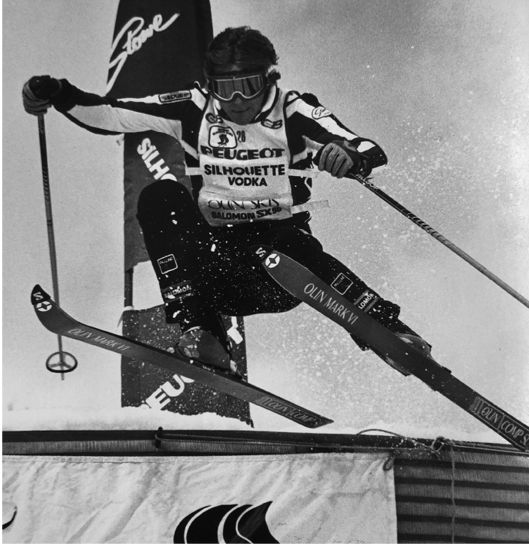
That experience helps Dodge relate to the athletes who come to Dartmouth with unfinished business. “After two stints on the U.S. Ski Team, I knew I could ski better. I just wanted to go out and ski the way I knew how to ski.” As with so many American and international skiing stars in that era, he found the World Pro Tour to be liberating.
“The beauty of the pro tour was there were no politics: You show up and go fast,” he says. Dodge found immediate success, winning Rookie of the Year in 1980. After nine years, he retired in 1989 and went to work for his longtime supporter CB Vaughan at CB Sports. Just as he was looking to return to college to finish his degree, the Dartmouth coaching job came up. Dodge took the position over from Mark Ford, who’d been on that same Europa Cup bus tour that launched his international success. Ford’s son is the aforementioned Tommy, currently America’s top giant slalom skier.
COLLEGE RACING’S COMEBACK
At Dartmouth, Dodge inherited a big piece of skiing history and built on the tradition. He has presided over an era that saw NCAA racing move from a step-down program for elite junior racers, to a highly competitive arena where top athletes toggle between the World Cup and the carnival circuit, and often continue their athletic careers after graduation. In many respects, it has returned college racing to its roots and relevance.
“Ski racing in the U.S. was originally born out of college outing clubs,” explains Dodge. Chief among them was the Dartmouth Outing Club, which organized the first Winter Carnival in 1911. Until Bob Beattie organized a U.S. Ski Team in the 1960s, Olympic teams were chosen from the college rosters. As the U.S. Ski Team grew, college racing became less relevant for development, though some athletes—like Dave Currier, Dodge and Tiger Shaw—were able to work Dartmouth’s flexible D-Plan around their competition schedules.
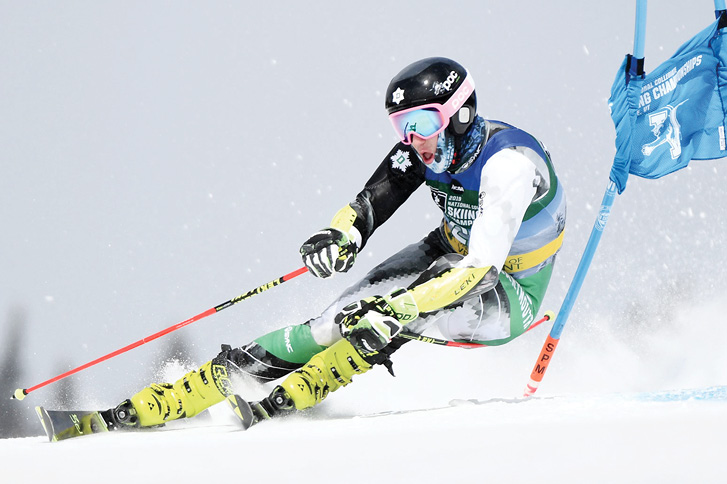
Shortly after Dodge took over, college coaches in the West, including Richard Rokos at Colorado and George Brooks at the University of New Mexico, took the lead from the World University Games and held some FIS-sanctioned University (FIS UNI) races. Dodge, who was president of the Eastern Intercollegiate Ski Association (EISA), saw the opportunity in that, and eventually Dartmouth hosted the first official EISA FIS UNI race in 1995. “That changed things,” he explains. In a push to make the tour better, FIS UNI races were phased in and become the norm.
As FIS-level racing legitimized the circuit, and the level of competition rose accordingly, NCAA skiers—from the U.S. and other countries— started moving to their national teams after college. In Dodge’s tenure as coach, skiers who advanced to their national teams, after competing for and graduating from Dartmouth, include: Bill Gaylord (GBR), Patrick Biggs (CAN), Martin Anguita (CHI), Brad Wall (AUS), Tanguy Nef (SUI) and Americans Andy Martin, Roger Brown, Paul McDonald, David Chodounsky, Ace Tarberry, and McLaughlin. Nef, who will graduate with a computer science degree next spring, scored two top 10 World Cup slalom results last season.
By the time Chodounsky, a last-minute recruit, started at Dartmouth in 2004, the team was “stacked,” he recalls. (Dartmouth men won the NCAA slalom title for five years straight, from 2002 to 2006.) “I was not the top guy, but I knew I was going to a good team,” he says. It was also a tight-knit, hard-working and fun-loving team. Dartmouth’s all-American squad won the NCAA championships in 2007. “Peter never pressured us to finish,” he adds. “He told us you have to go for it if you want to win.” He’d also remind his athletes: “Someone’s got to win today. It might as well be you!”
By Chodounsky’s senior year, he was invited to compete on the Europa Cup with the U.S. Ski Team. As is his policy, Dodge fully encouraged the opportunity for higher-level competition, even though it meant missing two carnivals. Chodounsky graduated in four years with a double major in engineering and earth science and went on to become the top American slalom skier, spending nine years on the U.S. Ski Team and competing in two Olympics.
THE DARTMOUTH EXPERIENCE
Chodounsky’s success not only made him the poster child for the Dartmouth Experience, but also triggered a shift in perception. College racing, for some athletes, can not only be a path for elite development, but also the preferred path: Four years in a stable, social, intellectually stimulating team structure can be an ideal environment for discovering true potential. “Dartmouth is all about excellence in academics, conduct, standards… having a good experience for athletes,” says Dodge. “Winning is fun, but it’s not all it’s about. We’re preparing them for life.”
That starts by creating a supportive team atmosphere, which is not a mere consequence of a team sport. “We really work on it,” says Dodge, who encourages athletes to help coach each other. “When you coach someone else, you improve your own skiing,” he explains. Dodge, who bristles at the concept of hazing, encourages incoming athletes to be leaders from the start. “I tell them there is no seniority or hierarchy here. Learn from the seniors, but I don’t expect you to be the last one in line. If you go fast, you’ll start.”
The appealing combo of high-level training and personal development—highlighted most recently by Chodounsky and McLaughlin—has brought Dartmouth an embarrassment of riches, particularly in American ski talent. Again this season, the team will include athletes with multiple years of USST experience. Many have aspirations to continue racing through and after college. In all, Dodge has 12 athletes vying for six spots in each carnival.
Dodge points out that the high level of competition is not unique to Dartmouth, and not unique to men. “Nationally, there’s a lot of college talent. We’re head-to-head with other top teams.”
Athletes like Leif Kristian Nestvold-Haugen, Trevor Philp and Erik Read (all racing for the University of Denver), Jonathan Nordbotten (University of Vermont) and David Ketterer (University of Colorado) have established NCAA legitimacy on the men’s side. And “five past or current NCAA women are scoring on the World Cup,” Dodge says. These include Canadians Laurence St. Germain, Amelia Smart, Ali Nullmeyer and Roni Remme, as well as U.S. racer Paula Moltzan. Meanwhile, U.S. Ski Team members Katie Hensien and Keely Cashman, both World Junior medalists, are competing on the NCAA circuit this season for Denver and Utah, respectively.
If the U.S. has been slower than other nations (especially Norway and Canada) to capitalize on collegiate programs as a development resource, Dodge continues to advocate for ways in which skiers can work towards the national team. “The key is not centralizing,” he says — not defaulting to a system of making selections and choosing stars. That said, coordinating national development with colleges, regions and clubs—so they can all support each other— is particularly important for NCAA college teams, which are not allowed to train together out of season. Dodge has participated in summer projects that bring NCAA athletes from several schools together under the U.S. Ski Team umbrella, and is optimistic about its potential for future collaboration.
Meanwhile, as the NCAA moves to develop rules that allow student-athletes to receive compensation for their “name, image and likeness,” Dodge sees that college skiers—many of whom must buy their own equipment—will see some real benefit. “If ski companies could get some promotional value from college skiers, it would provide incentive for them to provide better and/or less expensive equipment … or even some compensation.”
Along his way, Dodge wondered if he should have tried something else or moved somewhere else— or maybe just gone after a big paycheck as a private coach. But he also realizes that having the opportunity and freedom to build and run a program the way he wants is a good gig. From his base in the Dartmouth Outing Club, his influence on American skiing has been far-reaching and profound. It’s also been rewarding.
“I get to work with great kids and great families, and it keeps you young,” he says. He’s close to his son Jensen, who will play hockey this year for the Morrisville State College Mustangs, and lives next to his dad, Duffy, who quit skiing at age 90. He gets to see plenty of friends who went to New York and made their millions. “When they say they want to move back to Hanover, I say, ‘I’ve got you beat!” 
Edith Thys Morgan spent eight years as a member of the U.S. Ski Team, competed in two Olympics (1988, 1992) and three FIS Alpine World Championships (1987, 1989 and 1991), and was ranked among the top ten downhill and Super G skiers in the world. She retired from racing in 1993. She’s now a writer, blogger, frequent Skiing History contributor, and ski-racing mom. She lives in Hanover, New Hampshire with her family. Learn more at racerex.com. An earlier version of this article first appeared on skiracing.com.


Table of Contents
2020 Corporate Sponsors

World Championship
($3,000 and up)
Gorsuch
Intuition Sports, Inc.
Polartec
Sport Obermeyer LTD
Warren and Laurie Miller
World Cup ($1,000)
Aspen Skiing Company
BEWI Productions
Bogner
Boyne Resorts
Country Ski & Sport
Dale of Norway
Darn Tough Vermont
Descente North America
Dynastar | Lange | Look
Fairbank Group: Bromley, Cranmore, Jiminy Peak
Gordini USA Inc. | Kombi LTD
HEAD Wintersports
Hickory & Tweed Ski Shop
Mammoth Mountain
Marker-Völkl USA
National Ski Areas Association (NSAA)
Outdoor Retailer
POWDR Adventure Lifestyle Corp.
Rossignol
Ski Area Management
Ski Country Sports
Snowsports Merchadising Corporation
Sports Specialists Ltd.
Sun Valley Resort
Vintage Ski World
World Cup Supply, Inc.
Gold ($700)
Race Place | BEAST Tuning Tools
The Ski Company (Rochester, NY)
Thule
Silver ($500)
Alta Ski Area
Clic Goggles
Dalbello Sports
Dill McWhorter Driscoll LLC
Ecosign Mountain Resort Planners
Holiday Valley
Hotronic USA, Inc. | Wintersteiger
MasterFit Enterprises
Metropolitan New York Ski Council
Mt. Bachelor
NILS, Inc.
Portland Woolen Mills
Russell Mace Vacation Homes
Schoeller Textile USA
Scott Sports
Seirus Innovations
SeniorsSkiing.com
Ski Utah
Snow Time, Inc.
Tecnica Group USA
Timberline Lodge & Ski Area
Trapp Family Lodge
Vuarnet
Western Winter Sports Reps Association
World Pro Ski Tour
For information, contact: Peter Kirkpatrick | 541.944.3095 | peterk10950@gmail.com
ISHA deeply appreciates your generous support!


